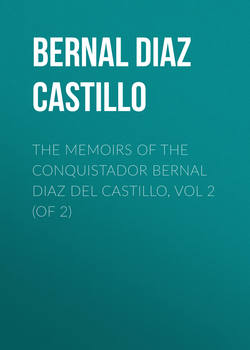Читать книгу The Memoirs of the Conquistador Bernal Diaz del Castillo, Vol 2 (of 2) - Bernal Diaz del Castillo - Страница 13
CHAPTER CXLIX
ОглавлениеThe manner in which Cortes selects the men who were to row the brigantines; of the commanders who were appointed to each, and of other matters.
Cortes on selecting the men who were to serve on board the brigantines could not find a sufficient number of sailors to row them. All the sailors who had come with us, with Narvaez, and with the vessels which had recently arrived from Jamaica, had been duly noted down, but even then there was not a sufficient number. Besides which many would not condescend to this work, saying, it was unreasonable to think of making rowers of them.
Cortes then turned his attention to those who daily went out a fishing, and found they were mostly natives of Palos, Moguer, Triana, or other coast towns, which were celebrated for producing capital sailors. All these persons were commanded under threats of severe punishment, to enter without delay upon the service of the brigantines. Many, indeed, who were men of noble birth, remonstrated with our general, and told him, it was insulting to think of setting them to such work; but Cortes paid no respect to persons, and by these means he mustered one hundred and fifty capital oars, who indeed had better days of it than we who had to fight on the causeways, and obtained a much greater share of booty than we did, as will be sufficiently seen hereafter.
As soon as each brigantine was fully equipped for war, Cortes ordered a flag, bearing the royal arms, to be hoisted; and a second one, bearing the number of the vessel. The following were the commanders appointed: viz. Pedro Barba, Garcia Holguin, Juan de Limpias, the deaf Carvajal, Juan Xaramillo, Geronimo de la Mota, the other Carvajal, who now lives at an advanced age in the street San Francisco; a certain Portillo, an excellent soldier, who had just arrived from Spain and had brought a beautiful wife with him. The naval captain Zamora, who lives at present in Guaxaca. A certain Colmero, who was both a good sailor and a good soldier. Further, Lerma, Gines, Nortes, Briones of Salamanca, Miguel Diaz de Auz, and one other officer, whose name has slipped my memory.
The whole of the crews were strictly enjoined to pay implicit obedience to their commanders; and any one who left his vessel was liable to severe punishment. The several commanders then received their particular instructions as to the manner in which they were to cooperate with the land forces.
All these matters had just been arranged when Cortes received intelligence that the Tlascallan chiefs were marching with a large body of troops, consisting of Tlascallans and Huexotzincans. The chief command of these had been intrusted to the younger Xicotencatl, the same who commanded against us in our battles with Tlascalla. He was likewise accompanied by his two brothers, the two younger sons of the excellent Don Lorenzo de Vargas. One of the chiefs of Cholulla likewise made his appearance, but with a very small body of men; for, though the Cholullans had broken off their alliance with Mexico from the time we had punished them so severely, yet they never stood upon the best of terms with us; on the contrary, they appeared as if waiting to see how matters would terminate, and then to side with the triumphant party. After our direful retreat from Mexico, they were almost upon the point of declaring against us.
When Cortes was informed of Xicotencatl's approach, who had come a day before the time appointed, he went out with Alvarado and several other officers to a distance of about a mile from Tezcuco, and welcomed him and his brothers with every demonstration of joy. Xicotencatl, with his men, marched forward in the best order, and all were accoutred in their best garments. Every company had a standard, on which was embroidered a white bird with expanded wings, being the arms of Tlascalla, and resembled an eagle. Every one of the men had a bunch of plumes stuck on his head; they struck up their war music, waved their flags, and continually cried out, "Long live the emperor, our master! Spain for ever! Tlascalla for ever!"
It took these troops about three hours before they had all entered the town, and our general ordered them to be provided with good quarters, and the best food we could get. When they had all entered the town, he once more bid them heartily welcome, assuring them he would enrich them all, and then desired them to rest from their fatigues, adding, that he would let them know the next day the duty they would have to perform.
Almost at the very moment these Tlascallans were marching into Tezcuco, a letter was put into Cortes' hands from Hernando de Barrientos, who was at Chinantla, about 360 miles from Mexico. Barrientos related that, while he was exploring the mines, being left behind for that purpose by Pizarro, the Mexicans had attacked him, and killed three of his companions, and that he alone had been fortunate enough to escape to the inhabitants of Chinantla, who were at enmity with the Mexicans. This was the same people who had furnished us with those long lances in our battle against Narvaez.
Without wishing to repeat the whole contents of this letter, I will only state that Cortes, in answer to it, told him he was about to besiege Mexico, and cautioned him to keep on good terms with the caziques of the country, and not to leave that place until he should receive further intelligence from head-quarters; for he would run great danger of being murdered on the road by the Mexicans.
